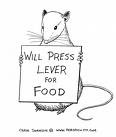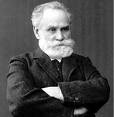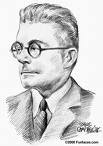Operant conditioning is distinguished from classical conditioning (also called respondent conditioning, or Pavlovian conditioning) in that operant conditioning deals with the modification of "voluntary behavior" or operant behavior. Operant behavior "operates" on the environment and is maintained by its consequences, while classical conditioning deals with the conditioning of respondent behaviors which are elicited by antecedent conditions. Behaviors conditioned via a classical conditioning procedure are not maintained by consequences.The main dependent variable is the rate of response that is developed over a period of time. New operant responses can be further developed and shaped by reinforcing close approximations of the desired response
bibliography:http://en.wikipedia.org/wiki/Operant_conditioning
lunes, 22 de marzo de 2010

1. PUNISHMENT OFTEN FAILS TO STOP, AND CAN EVEN INCREASE THE OCCURRENCE OF, THE UNDESIRED RESPONSE. Since attention is one of the most potent rewards available, and since it is difficult to punish without paying attention to the offender, punishing may serve more as a reward than as a punishment.
2. PUNISHMENT AROUSES STRONG EMOTIONAL RESPONSES THAT MAY GENERALIZE. Once the strong emotional responses are aroused the degree and direction of generalization is largely uncontrollable. The result may be excessive anxiety, apprehension, guilt, and self-punishment.
3. USING PUNISHMENT MODELS AGGRESSION. The meaning of "social power is exemplified.
4. INTERNAL CONTROL OF BEHAVIOR IS NOT LEARNED. The offender may learn to inhibit the punished response during surveillance, but once surveillance ends there is no internal control mechanism to continue inhibiting the behavior.

Operant conditioning is the use of consequences to modify the occurrence and form of behavior. It's important to note that organisms are not spoken of as being reinforced, punished, or extinguished; it is the response that is reinforced, punished, or extinguished. Additionally, reinforcement, punishment, and extinction are not terms whose use is restricted to the laboratory. Naturally occurring consequences can also be said to reinforce, punish, or extinguish behavior and are not always delivered by people.
Positive reinforcement (Reinforcement) occurs when a behavior (response) is followed by a favorable stimulus (commonly seen as pleasant) that increases the frequency of that behavior. In the Skinner box experiment, a stimulus such as food or sugar solution can be delivered when the rat engages in a target behavior, such as pressing a lever.
Negative reinforcement (Escape) occurs when a behavior (response) is followed by the removal of an aversive stimulus (commonly seen as unpleasant) thereby increasing that behavior's frequency. In the Skinner box experiment, negative reinforcement can be a loud noise continuously sounding inside the rat's cage until it engages in the target behavior, such as pressing a lever, upon which the loud noise is removed.
Positive punishment (Punishment) (also called "Punishment by contingent stimulation") occurs when a behavior (response) is followed by an aversive stimulus, such as introducing a shock or loud noise, resulting in a decrease in that behavior.
Negative punishment (Penalty) (also called "Punishment by contingent withdrawal") occurs when a behavior (response) is followed by the removal of a favorable stimulus, such as taking away a child's toy following an undesired behavior, resulting in a decrease in that behavior.
Positive reinforcement (Reinforcement) occurs when a behavior (response) is followed by a favorable stimulus (commonly seen as pleasant) that increases the frequency of that behavior. In the Skinner box experiment, a stimulus such as food or sugar solution can be delivered when the rat engages in a target behavior, such as pressing a lever.
Negative reinforcement (Escape) occurs when a behavior (response) is followed by the removal of an aversive stimulus (commonly seen as unpleasant) thereby increasing that behavior's frequency. In the Skinner box experiment, negative reinforcement can be a loud noise continuously sounding inside the rat's cage until it engages in the target behavior, such as pressing a lever, upon which the loud noise is removed.
Positive punishment (Punishment) (also called "Punishment by contingent stimulation") occurs when a behavior (response) is followed by an aversive stimulus, such as introducing a shock or loud noise, resulting in a decrease in that behavior.
Negative punishment (Penalty) (also called "Punishment by contingent withdrawal") occurs when a behavior (response) is followed by the removal of a favorable stimulus, such as taking away a child's toy following an undesired behavior, resulting in a decrease in that behavior.
Bibiliography:http://en.wikipedia.org/wiki/Operant_conditioning


Burrhus Frederick Skinner born in March 20 1904 and died August 18 1990. He was a psychologist, author, inventor, advocate for the social reform, and poet. In his time he was the Edgar Pierce professor of psychology at Harvard University in 1958. Until he retired in 1974. He was responsable for the operant conditioning chamber, which innovated his theory named Radical Behaviorism.
Later he founded his own school of experimental psychology named the experimental analysis of behavior, here his work culminated in his final presentation Verbal Behavior. This work has recently been a point of great attention. He discovered and advanced the rate of response as a dependant variable. Also, he invented the cumulative recorder, this was to measure the rate of responding as part of his highly influenctial work on schedule of reinforcement. A survey showed the he was the most influential psychologist of the 20th century, he published 21 books and 180 articles throughout his career. :)
Bibliography: wikipedia.com/wiki/B._F._Skinner
viernes, 5 de marzo de 2010

John Broadus Watson (January 9, 1878 – September 25, 1958) was an American psychologist who established the psychological school of behaviorism, after doing research on animal behavior. He also conducted the controversial "Little Albert" experiment. Later he went on from psychology to become a popular author on child-rearing, and an acclaimed contributor to the advertising industry. The "manifesto" notably lacks references to specific principles of behavior. In 1913, Watson viewed Ivan Pavlov's conditioned reflex as primarily a physiological mechanism controlling glandular secretions. He had already rejected Edward L. Thorndike's "Law of Effect" (a precursor to B. F. Skinner's principle of reinforcement) due to what Watson believed were unnecessary subjective elements. It was not until 1916 that Watson would recognize the more general significance of Pavlov's formulation and make it the subject of his presidential address to the American Psychological Association. The lack of a specific mechanism of behavior caused Watson's colleagues to dismiss "Psychology as the Behaviorist Views It" as philosophical speculation without much foundation. The article only became well-known to psychologists generally after it started to be widely cited in introductory psychology textbooks in the 1950s. The article is also notable for its strong defense of the objective scientific status of applied psychology, which at the time was considered to be much inferior to the established structuralist experimental psychology.
miércoles, 3 de marzo de 2010

Ivan Pavlov, was awarded the Nobel Prize in Physiology or Medicine in 1904 for research pertaining to the digestive system. Pavlov is widely known for first describing the phenomenon of classical conditioning. He developed this theory when investigating the gastric function of dogs by externalizing a salivary gland so he could collect, measure, and analyze the saliva and what response it had to food under different conditions. He noticed that the dogs tended to salivate before food was actually delivered to their mouths, and set out to investigate this "psychic secretion", as he called it.
martes, 2 de marzo de 2010
Suscribirse a:
Entradas (Atom)

